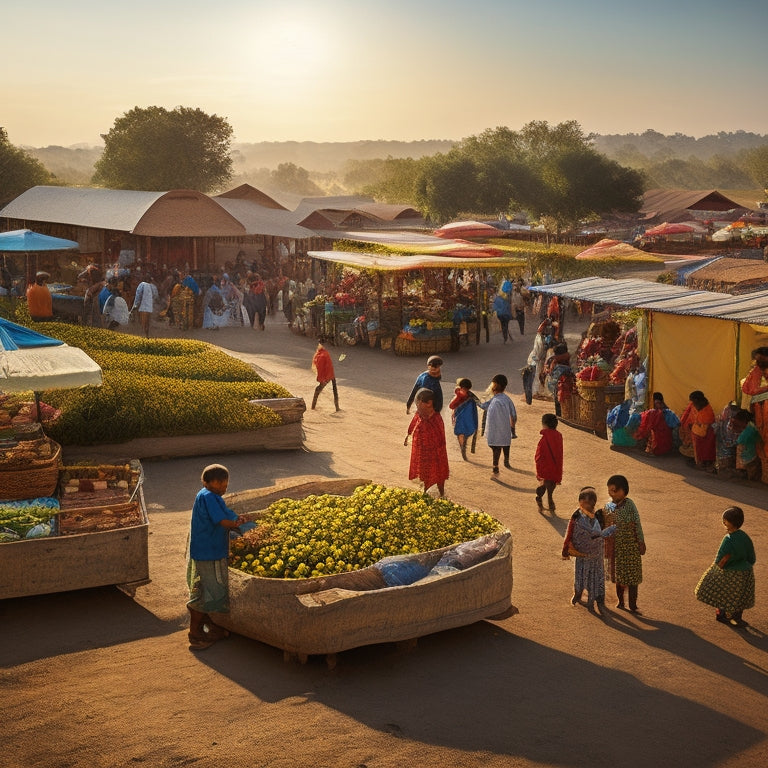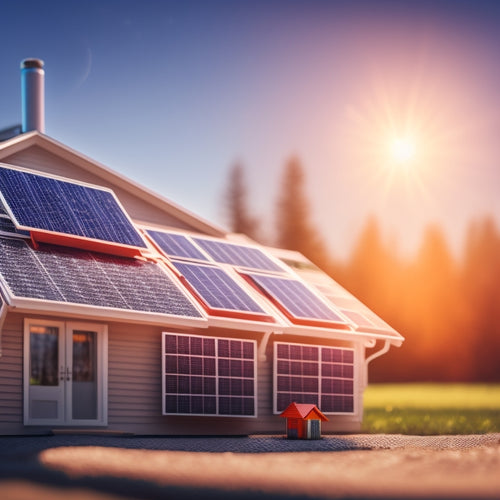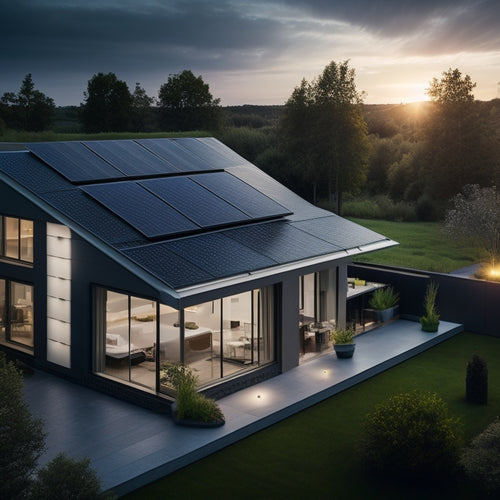
What Energizes Rural Communities in Developing Countries?
Share
You're looking for the spark that ignites rural communities in developing countries. It's renewable energy access! By harnessing local resources, you can empower small businesses, enhance education and healthcare, and foster community engagement. Off-grid solar battery solutions light up homes, power agriculture, and support healthcare facilities. Renewable energy is key to rural development, promoting social cohesion, economic opportunities, and increased productivity. As you venture further, you'll discover how green financing, sustainable energy solutions, and community-led initiatives can transform rural livelihoods and energize local economies.
Key Takeaways
• Renewable energy resources, such as solar and wind power, energize rural communities in developing countries.
• Off-grid solar battery solutions provide reliable energy access, powering homes, businesses, and essential services.
• Empowering rural communities through energy boosts economic productivity, enhances education and healthcare, and fosters community engagement.
• Renewable energy catalyzes economic growth, thrives local entrepreneurship, and innovates rural development.
• Sustainable energy solutions overcome energy access challenges, promote food security, and reduce reliance on biomass fuels.
Harnessing Local Renewable Resources
By leveraging local renewable resources, you can jumpstart rural development and reduce reliance on expensive, polluting fuels that drain community resources. This approach not only helps the environment but also stimulates local economies.
You can start by identifying the unique renewable energy resources available in your area. Conducting a resource mapping exercise can help you pinpoint areas with high potential for solar, wind, hydro, or biomass energy.
This information can then be used to develop local infrastructure that supports the integration of these resources into the energy mix.
Empowering Rural Communities Through Energy
With access to reliable energy, you can access opportunities for social and economic growth, improving the overall quality of life for rural communities. Energy empowerment is key to unleashing the potential of these communities, enabling them to thrive and grow.
By providing access to energy, you can:
-
Boost economic productivity: With energy, rural communities can power small businesses, farms, and industries, creating jobs and stimulating local economies.
-
Enhance education and healthcare: Reliable energy enables schools and healthcare facilities to function effectively, improving education and health outcomes.
-
Foster community engagement: Energy access enables community centers, libraries, and other social hubs to operate, promoting social cohesion and community development.
To achieve this, emphasizing Community Engagement and Energy Literacy is crucial. By educating rural communities about energy management and safety, you can make sure they can maintain and operate energy systems effectively.
Additionally, engaging with local communities helps tailor energy solutions to their specific needs, fostering a sense of ownership and responsibility.
Off-Grid Solar Battery Solutions
When exploring off-grid solar battery solutions, you'll find that renewable energy access is key to empowering rural communities.
You'll need to assess energy storage systems that can efficiently harness and store solar power, especially during periods of low sunlight.
Renewable Energy Access
In rural communities where the grid is often a distant dream, off-grid solar battery solutions can be a beacon of hope, empowering you to harness the energy of the sun and break free from the shackles of energy poverty. Renewable energy access is no longer a luxury, but a necessity for communities to thrive.
By embracing off-grid solar battery solutions, you can:
- Light up homes and businesses, powering essential appliances and enabling economic activities to flourish.
- Irrigate crops and pump water, supporting agricultural growth and providing access to clean water.
- Power healthcare facilities, ensuring life-saving medical services remain operational.
Through community engagement, off-grid solar battery solutions can be tailored to meet the unique needs of each rural community, tackling energy poverty head-on. By leveraging renewable energy, you're not only bridging the energy gap but also fostering a healthier, more productive, and resilient community.
Energy Storage Systems
You're likely wondering how to keep the lights on and appliances running when the sun dips below the horizon, and that's where energy storage systems come in. Off-grid solar battery solutions are a game-changer for rural communities in developing countries. These energy storage systems guarantee that the power stays on even when the sun isn't shining, providing grid resilience and reliability.
With technology advancements, energy storage systems have become more efficient, affordable, and accessible. You can now store excess energy generated during the day for use during the night or on cloudy days. This means you can power your home, school, or healthcare facility without interruption, even when the grid is down.
Imagine having a reliable source of energy to power critical services like healthcare, education, and communication. Energy storage systems make this possible, empowering rural communities to thrive.
Renewable Energy for Rural Development
As you explore ways to energize rural communities in developing countries, you'll realize that renewable energy is key to unleashing rural development.
You'll face challenges, such as energy access issues, that hinder economic growth and social progress.
Now, let's examine how sustainable energy solutions can overcome these hurdles and empower rural communities to thrive.
Energy Access Matters
Rural communities in developing countries are crippled by energy poverty, which hinders economic growth and perpetuates cycles of poverty. You've likely seen the devastating effects firsthand: children studying by candlelight, farmers struggling to irrigate their crops, and entrepreneurs unable to power their businesses.
Energy access matters because it opens up opportunities for growth and development. Consider the following benefits:
-
Community Engagement: Renewable energy projects can promote a sense of community and social cohesion, as residents come together to maintain and manage local energy systems.
-
Economic Opportunities: Access to reliable energy enables entrepreneurs to start and grow businesses, creating jobs and stimulating local economies.
-
Increased Productivity: With energy, farmers can irrigate their land, process their harvests, and access new markets, leading to increased productivity and income.
Rural Energy Challenges
In remote areas, where energy infrastructure is scarce or non-existent, the struggle to access reliable power is a daily reality. You're not alone in this struggle. Millions of people in rural communities face the same challenges. The lack of energy access leads to fuel poverty, where you're forced to rely on expensive and polluting fuels, such as kerosene and diesel. This perpetuates energy inequality, where those who need energy the most are often the ones who have the least access to it.
| Challenge | Impact | Consequence |
|---|---|---|
| Limited energy access | Reduced economic opportunities | Perpetuates poverty cycles |
| Inefficient energy use | Environmental degradation | Health risks from indoor pollution |
| High energy costs | Reduced household income | Limited access to basic needs |
| Lack of energy data | Inadequate energy planning | Inefficient energy distribution |
As you navigate these challenges, it's important to acknowledge the interconnectedness of energy access, poverty, and inequality. Understanding these challenges is vital to developing effective solutions that address the unique needs of rural communities.
Sustainable Energy Solutions
You're now empowered to harness the potential of sustainable energy solutions, which can transform the fabric of rural communities by providing reliable, clean, and affordable power. Renewable energy sources like solar, wind, and hydroelectric power can replace traditional fossil fuels, reducing greenhouse gas emissions and mitigating climate change. This shift towards sustainable energy solutions can have a profound impact on rural development.
Here are three ways sustainable energy solutions can benefit rural communities:
-
Increased energy access: Renewable energy can power homes, schools, and healthcare facilities, improving the overall quality of life.
-
Rural resilience: By reducing dependence on fossil fuels, rural communities can build resilience against price volatility and supply chain disruptions.
-
Green financing opportunities: Sustainable energy projects can attract green financing, creating new economic opportunities and stimulating local economies.
Sustainable Energy for Rural Livelihoods
As you explore the world of rural communities in developing countries, you'll find that sustainable energy for rural livelihoods is essential. About 80% of the population in developing countries relies on biomass fuels, like wood and agricultural waste, for their daily energy needs, which not only harms their health but also the environment.
You'll realize that this reliance on biomass fuels has severe consequences, including respiratory diseases, deforestation, and climate change.
However, there's hope. You can play a role in promoting sustainable energy for rural livelihoods. For instance, you can support initiatives that provide access to clean energy for food security.
Imagine empowering farmers with solar-powered water pumps to irrigate their crops, ensuring a bountiful harvest and increased food security. This not only benefits the farmers but also their communities, as they'll have access to fresh produce and a better quality of life.
Energizing Rural Economies With Renewables
By leveraging renewable energy sources, you can catalyze economic growth in rural areas, creating thriving local economies that benefit entire communities. This not only provides energy access but also empowers rural entrepreneurship, fostering innovation and job creation. With renewables, you can power green infrastructure, such as irrigation systems, cold storage facilities, and communication networks, which are essential for rural development.
Here are three ways renewables can energize rural economies:
-
Rural Entrepreneurship: By providing reliable and affordable energy, you enable entrepreneurs to start and grow businesses, creating jobs and stimulating local economies.
-
Green Infrastructure: Renewables can power green infrastructure, such as solar-powered water pumps, reducing energy costs and increasing agricultural productivity.
-
Energy Access: With renewables, you can electrify rural communities, providing energy access to households, schools, and healthcare facilities, improving overall quality of life.
Frequently Asked Questions
How Can Rural Communities Access Affordable Renewable Energy Solutions?
You can access affordable renewable energy solutions by joining energy cooperatives, which enable collective purchasing and sharing of resources, or investing in microgrids, allowing you to generate and distribute energy locally, reducing costs and increasing efficiency.
What Role Do Local Governments Play in Rural Energy Development?
You empower rural energy development when you work with local governments, who create policy frameworks that support community engagement, fostering a collaborative environment where renewable energy solutions thrive.
Can Renewable Energy Create Jobs in Rural Areas?
You can spark rural entrepreneurship by investing in renewable energy, creating jobs and empowering local communities through energy cooperatives, which foster ownership, skills development, and sustainable growth.
How Do Energy Access Programs Measure Their Success?
You assess the effectiveness of energy access programs by tracking Impact Metrics, such as connections made, kWh generated, and lives improved, and celebrating Success Stories that showcase the transformative power of energy access.
What Are the Challenges of Maintaining Off-Grid Energy Systems?
You face challenges in maintaining off-grid energy systems, including ensuring grid resilience and managing energy decentralization, which requires balancing local needs with technical and financial constraints.
Related Posts
-

A Beginner's Guide to Navigating the Solar Investment Tax Credit
You're eligible to claim a significant Solar Investment Tax Credit (ITC) of 30% of total installation costs, but mane...
-

Top 10 Off Grid Camping Gear Must-Haves
When you're off-grid camping, the right gear is crucial for a smooth expedition. Start with a durable, weather-resist...
-

Home Solar Battery
You're opting for a home solar battery that allows you to utilize the power of the sun during the day and use it at n...


